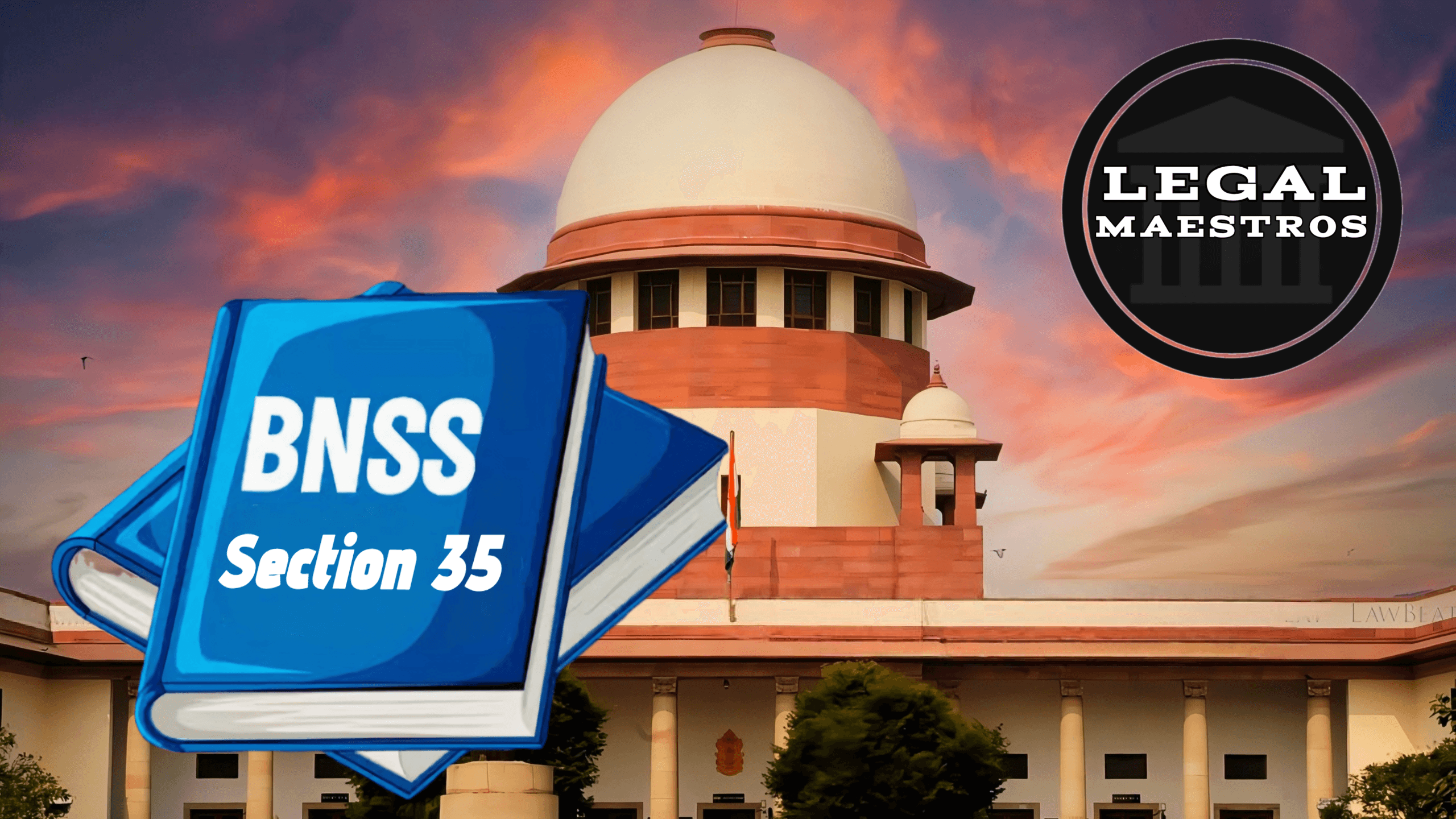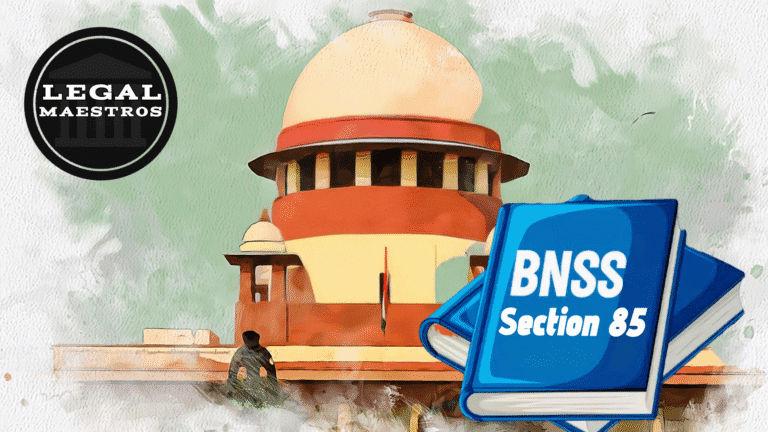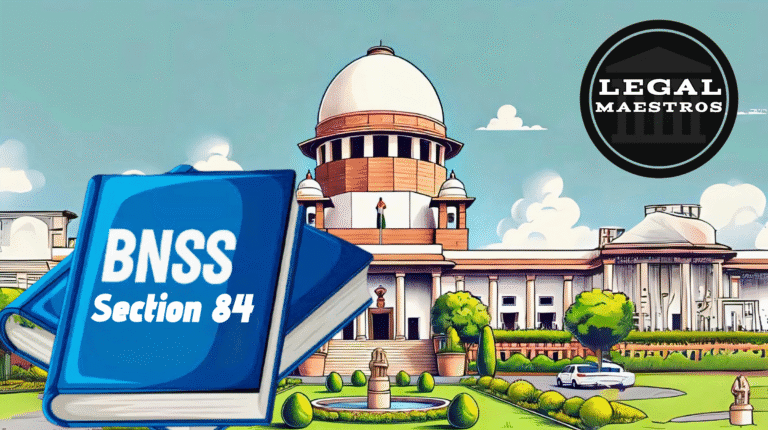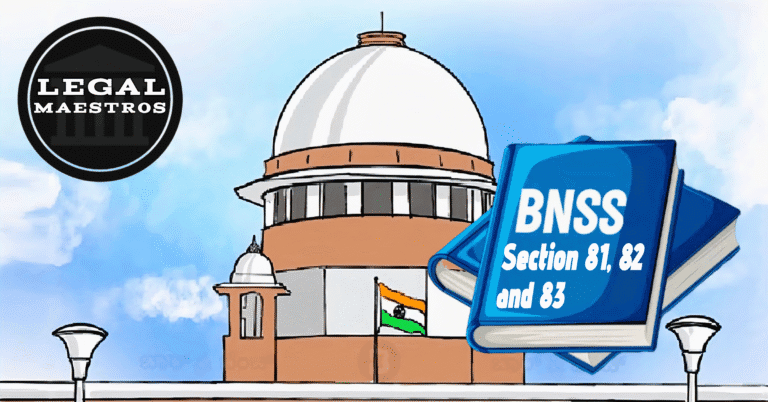
Understanding Section 35: When Police May Arrest Without a Warrant
In Section 35 of the Bharatiya Nagarik Suraksha Sanhita, 2023, the requirements that must be met for a police officer to be able to arrest a person without the necessity for previous approval from a Magistrate or a warrant are outlined. For the purpose of striking a balance between the protection of individual rights and the necessity of law enforcement, this provision is of great significance. In this article, each clause of Section 35 is expounded upon using straightforward language and accompanied by pictures, therefore ensuring that each sub-section is thoroughly covered.
In the presence of a cognizable offense, arrest without a warrant is expressly prohibited under Clause (1)(a).
According to subsection (a) of section 35, if a person commits a cognizable offense while a police officer is present, the officer has the authority to instantly arrest the accused without first obtaining a warrant or an ordinance from a magistrate.
For example, if a person is caught stealing a pocketbook in a public market and a police officer is present and observes the conduct, the officer has the authority to arrest the offender immediately without the need for any paperwork to be filled out.
For any queries or to publish an article or post or advertisement on our platform, do call at +91 6377460764 or email us at contact@legalmaestros.com.
An arrest made on the basis of a complaint, information, or suspicion of criminal activity Retribution of up to seven years – (1) The Clause (a) (b)
The police have the authority to make an arrest of a person if they have a legitimate complaint, credible information, or reasonable suspicion that the individual is responsible for committing a cognizable offense that is punishable by imprisonment for a period of time that is less than or up to seven years. But there are two prerequisites that must be satisfied:
It is necessary for the law enforcement officer to have a reasonable basis for believing, on the basis of the complaint, information, or suspicion, that the individual in question is perpetrator of the offense.
The police officer must be convinced that an arrest is required for one or more of the following reasons in order to fulfill condition (ii):
For any queries or to publish an article or post or advertisement on our platform, do call at +91 6377460764 or email us at contact@legalmaestros.com.
In order to refrain the individual from committing other offenses
In order to guarantee an accurate investigation
as a means of preventing the accused from tampering with the evidence
For any queries or to publish an article or post or advertisement on our platform, do call at +91 6377460764 or email us at contact@legalmaestros.com.
as a means of preventing the individual from intimidating or influencing witnesses
ensuring that the individual will appear in court when it is required to do so
It will be possible to make the arrest if these conditions are satisfied. Documentation of the reasons for the arrest is required to be made by the law enforcement official. The grounds for not making an arrest must also be noted in the event that an arrest is not made.
For any queries or to publish an article or post or advertisement on our platform, do call at +91 6377460764 or email us at contact@legalmaestros.com.
A man is suspected of committing fraud against a small corporation, as seen in the illustration. Because they have received credible information, the police have a reasonable suspicion that he is involved. In order to obtain evidence, the officer may place him under arrest if they have reason to believe that he may destroy financial records.
A person who is arrested for a cognizable offense that carries a sentence of more than seven years or death – Clause (1)(c)
In accordance with the provisions of Section 35(1)(c), it is permissible to make an arrest without a warrant if there is proof that the individual in question has committed a cognizable offense that is punishable by imprisonment for more than seven years or by death. On the basis of the information, the police must have a logical basis for believing that the individual in question did, in fact, conduct the offense.
Consider the following scenario: a somebody is accused of murder, and the police get credible information that points to that person, they have the authority to arrest that individual without a warrant or a court order.
For any queries or to publish an article or post or advertisement on our platform, do call at +91 6377460764 or email us at contact@legalmaestros.com.
Offenders Who Have Been Proclaimed – Clause (1) not (d)
According to Section 35(1)(d), the police have the authority to make an arrest without a warrant if the individual in question has been designated as a proclaimed offender by either a court or the relevant state government.
It is possible to place a person under arrest anytime they are discovered, provided that they have been labeled a proclaimed criminal by the court and have absconded during many instances.
Clause (1)(e): Possession of Property That Is Suspected to Have Been Stolen
A person who is in possession of an object that is considered to be stolen and who has a reasonable suspicion that they have committed an offense with reference to that item may be arrested without a warrant, according to Section 35(1)(e).
For any queries or to publish an article or post or advertisement on our platform, do call at +91 6377460764 or email us at contact@legalmaestros.com.
For example, if a person is caught selling a branded laptop at a very low price even though they do not have any proof of ownership, and the laptop is later discovered to have been reported stolen, the police have the authority to arrest the person.
Clause (1)(f): Obstructing the Police or Attempting to flee from custody
It is possible to make an arrest without a warrant under Section 35(1)(f) of the Criminal Code for anyone who obstructs a law enforcement officer while they are on duty, or who escapes or attempts to escape from lawful custody.
Consider the following scenario: a man who is being held for interrogation makes an attempt to flee from the police station. There is no need for a warrant to make another arrest of him.
For any queries or to publish an article or post or advertisement on our platform, do call at +91 6377460764 or email us at contact@legalmaestros.com.
Individuals who desert from the Armed Forces – Clause (1)(g)
According to subsection (g) of section 35, a person who is reasonably suspected of deserting from any branch of the Armed Forces of the Union can be arrested without a warrant if they can provide sufficient evidence.
An example of this would be a soldier who leaves his position without permission and is absent for several months. Once the soldier is located, the police have the authority to arrest him.
clause (1)(h) pertaining to acts committed outside of India
Individuals who are involved in acts that were conducted outside of India that would be considered offenses if they were committed in India are covered by Section 35(1)(h), which states that they are liable to be apprehended for those acts under extradition laws or other provisions that are equivalent.
For any queries or to publish an article or post or advertisement on our platform, do call at +91 6377460764 or email us at contact@legalmaestros.com.
As an illustration, if the process of extradition is commenced, a man who is now resident in India and who is suspected of financial fraud in the United Kingdom, which is also a serious violation in India, may be arrested without a warrant.
Breach by Released Convicts – Clause (1)(i) In the event that a released convict violates any regulation that was established in accordance with Section 394(5), they are eligible to be arrested without a warrant in accordance with Section 35(1)(i).
For example, a person who has been released on parole is required to report to the police on a weekly basis. If he does not comply with the rule, he may be arrested for his violation of the rule.
For any queries or to publish an article or post or advertisement on our platform, do call at +91 6377460764 or email us at contact@legalmaestros.com.
Clause 1 of the Requisition Submitted by Another Law Enforcement Officer to j
In the event that a requisition, whether verbal or written, is obtained from another officer, a police officer has the authority to make an arrest. In the demand, the individual’s name and the offense or reason for arrest must be mentioned in a clear and concise manner. Additionally, the requisition must demonstrate that the individual might have been properly apprehended by the officer who made the request.
It has been discovered that a suspect who was wanted in a robbery case in Delhi has been located in Mumbai. On the basis of a requisition from the Delhi police, the Mumbai police have the authority to arrest him.
Subsection (2) of the Restrictions on Arrest in Cases of Non-Cognizable Offences
No person who is involved in a non-cognizable offence can be arrested without a warrant or order from a Magistrate, as stated in Section 35(2). This is true even if there is a complaint, information, or suspicion against the individual in question.
For any queries or to publish an article or post or advertisement on our platform, do call at +91 6377460764 or email us at contact@legalmaestros.com.
As an illustration, if a person is charged with public annoyance, which is a non-cognizable offense, the police are not permitted to arrest them without the authorization of a Magistrate.
Notice as an Alternative to Arrest and the Third Subsection
The police are obligated to issue a notice to the individual in situations where an arrest is not required according to subsection (1). The notice must direct the individual to appear before the officer or at a particular location.
An example of this would be a man who is accused of committing a minor theft yet fits the circumstances that make arresting him unnecessary. In order to question him, the police have issued a notice to appear.
For any queries or to publish an article or post or advertisement on our platform, do call at +91 6377460764 or email us at contact@legalmaestros.com.
Subsection (4) of the Duty to Comply with Notice provision
Whoever receives such a notice is obligated to comply with the provisions of the notice. If you fail to comply, you may be subject to arrest.
If you comply with the clause, you will not be arrested.
In the event that the individual complies with the warning and continues to cooperate, the police will not be able to arrest him until additional causes for arrest arise, which must also be recorded.
Subsection (6) of the Notice: Non-Compliance with the Notice
In the event that a person does not comply with the notice or refuses to identify himself, he may be arrested for the offense that is indicated in the notice, subject to the orders of the court.
For any queries or to publish an article or post or advertisement on our platform, do call at +91 6377460764 or email us at contact@legalmaestros.com.
Special protection for the elderly and the disabled, as outlined in subsection (7)
When it comes to offenses that carry a sentence of less than three years in prison, a person who is either frail or older than sixty years of age cannot be arrested without the previous authorization of a law enforcement official who holds a rank that is not lower than that of Deputy Superintendent of Police.
By way of illustration, a man who is 65 years old and is accused of committing a minor offense such as defamation cannot be arrested without the authorization of a senior official.






![Research Assistantship @ Sahibnoor Singh Sindhu, [Remote; Stipend of Rs. 7.5k; Dec 2025 & Jan 2026]: Apply by Nov 14, 2025!](https://legalmaestros.com/wp-content/uploads/2025/11/Gemini_Generated_Image_s0k4u6s0k4u6s0k4-768x707.png)
![Karanjawala & Co Hiring Freshers for Legal Counsel [Immediate Joining; Full Time Position in Delhi]: Apply Now!](https://legalmaestros.com/wp-content/uploads/2025/11/Gemini_Generated_Image_52f8mg52f8mg52f8-768x711.png)